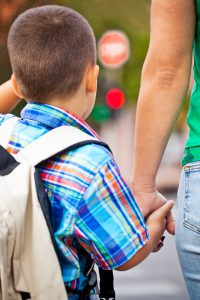By Kristen Bayliss
Psychologist, The Resilience Centre
At this point in the year the minds of many parents of preschool aged children
turn to the challenges and excitement of starting school for the first time.
We know that there are many transitions coming up for these children- from the
identity transition of ‘becoming a big school kid’ to the context transitions of
negotiating greater independence for tasks such as independent toileting, lunch
box balancing and lost hat finding.
While much emphasis can be placed on trying to accelerate classroom skills
teachers and researchers agree that children being ‘ready to learn’ at school has
a lot more to do with the socio-emotional skills and attitude to learning that a
child brings.
Being able to concentrate at a task for longer than 10 minutes and then switch
tasks successfully is an important foundation for a kindergarten child who has to
remain engaged and responsive to numerous different activities in a day- each
one important for their overall learning development.
At this stage children who are able to generate social solutions and negotiate
compromises amongst their peers are well placed for building stable and varied
friendships. These skills also form the foundation of logical problem solving and
the emergence of emotional intelligence. Families can enhance these skills by
asking their child to reflect on fairness and inviting them to solve common family
problems and disagreements with fairness and empathy. Co-operative board
games provide a fun opportunity for kids to experience working together for a
common goal, while traditional board games such as Ludo or checkers are a
useful education in winning graciously and losing well.
Starting school is also an important time to make sure your child’s emotional
literacy is developing well. School-ready children should be moving beyond the
basic ‘mad, bad, sad’ labels for their feelings and are ready to grapple with the
complexity involved in identifying emotions such as frustrated, lonely, left out,
disappointed, nervous, excited and proud. Being able to describe their
experience and feelings in these specific ways makes it more likely that a teacher
will be able to quickly get to the bottom of ‘tricky’ feelings and help your child
find solutions to problems in the classroom and playground.
Much can be made of the newfound independence and identity transition of
school starters and parents often feel the temptation to expect alot more from
their child’s behavior. Supporting independence at this stage often means
accepting some level of regression in behavior and self-regulation. Children who
are putting their all into adjustment to new routines, expectations and
relationships often have nothing left in the tank when it comes to managing
sibling squabbles, completing regular chores and maintaining an even emotional
keel through the week. Knowing your child’s weak points (tiredness,
possessiveness or wanting to throw off the shackles of conformity) can allow you to prepare to provide after-school experiences that refresh and rejuvenate them-
and you!








